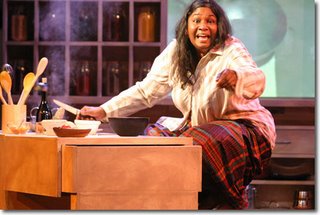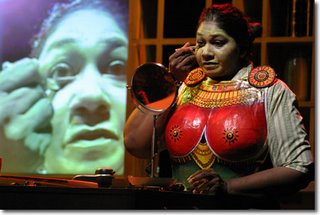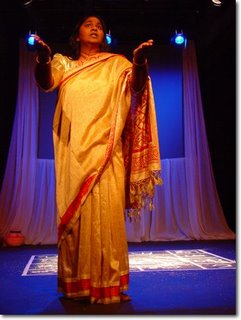Rani Moorthy - Rasa founder, sharp wit, intelligent, with finesse & style
Rani Moorthy – Fabulous, Tasty and simply Sensational with a bout of realism
By Ashanti OMkar


Brought to you by the lady that most South Asian ladies should aspire to, is Curry Tales, the one woman play that not only tells us about curry, has the audience tasting it, freshly cooked (and it is simply delicious) and not only brings sharp, witty comedy, but also grasps real subjects that Asians all over the world with identify with, whilst appealing to the International audiences on many levels too. Showing now at Lyric, Hammersmith, watch out for more of Rani’s work on http://www.rasatheatre.co.uk
Rani’s fabulous play, Pooja, which will be at the Croydon Clocktower November 25th 2004 for one night only. In a very interesting interview, the intelligent lady behind shows like Pooja and Curry Tales, who has also acted in mainstream cinema (Coronation Street), Rani Moorthy reveals all.
Tell us about your roots and cultural heritage.
Born in Malaysia but my family are Sri Lankan Tamil from Jaffna in Sri Lanka
What would you say is the big difference between theatre and entertainment in Singapore, where you grew up, to the UK?
There is quite a lot of censorship and restrictions in Singapore and politically its quite oppressive, so there was a limit to how much freedom artistes have. On the other hand, I understood my audience and knew instinctively where to take them. Here I face the sometimes frustrating task of making the work accessible to people, even Asian audiences who don’t quite know about South East Asia and The Asian Diaspora from there.

Starting up Rasa – what was the experience like, how did you do it and how successful is the company?
Didn’t really have a choice. I came here in 1996 and no one was going to give me work. Had to start creating work for myself. Sent a script to the Arts Council North west in Manchester and they gave me a grant. I had to give Lloyds Bank a name for business account and that was Rasa and the company got started.
How did you go about researching Curry Tales?
We went to South India, mainly Kerala and Chennai to look at the history of curry there and also art forms that I was interested in namely Kathakali and Theerukuthu.
Do you have a significant other, who helps share your life and it’s hectic-ness.
Fantastic soul mate Arthur Smith who is a cameraman and responsible for the fantastic video images in the show…three lovely step children
The Tamil language sketch in Curry Tales – what inspired that? How did you know you could convey the sentiment of the sketch to the audience?
It’s about generosity and something not readily evident in the West…that a slum dweller will share food despite having so little. And very much entrenched in the culture is the spiritual connection to food.

The ‘Kuthu’ style of theatre and it’s interactivity – tell us more.
When I toured Sri Lanka with “Pooja” my other one woman show (I was the first Tamil woman to perform in the war zone), an old relative of mine in Jaffna told me my great grand father was a Kuthu actor which is a style of acting that’s very immediate and makes Hindu epics accessible to audiences. I wanted to study this and did so in Chennai earlier this year when I was researching Curry Tales.
The ‘eggs’ connotations and the whole fertility thing – extremely emotional and also bringing some many ‘taboos’ in society – how did you think up this sketch?
A friend of mine who is white has the condition ovarian digenesis and when she was looking for donor eggs it was important to her that the donor woman had blonde hair. It made me think about an Asian woman with this condition and in a mixed marriage (like me). So I am always moved when I perform this bit.
Anapurna – a brilliant character – again, what was your thinking behind it?
There is a Hindu legend about the Goddess of food having a bisexual manifestation in the form of a statue that has both male and female feature. It made the connection with the class of transsexuals in India called the Hijrahs who historically cooked in palaces. So an incredible link formed in my imagination and I thought it was a poignant way to end the show.

In Pooja, How did the Hindu people reacting the criticism of their traditions?
People who really listen with their hearts know where I’m coming from and respond to the honesty and integrity of the piece. I’m not attacking tradition; I’m saying lets take another look at traditions that become dogma, especially among fearful and superstitious immigrants. Orthodox Hindus and some Asian men have problems with some aspects of what I am saying but my play is intended to just make you think. Incidentally it has a lot of humour in it and nothing has a pat answer.
Do you think that Pooja will cause controversy, but also open up the minds of the viewers?
I take refuge in the fact that it’s my story. Some people can say “that’s poor Rani’s life, me, my family, my children, we’re not like that, caste, skin colour, horoscope these things don’t touch us” OR There are people who thank me for articulating with humour thoughts and feeling we don’t often voice.

Bollywood depicts an India where everything is so rosy and modern but your play seems to be contradicting that?
In India everybody understands what Bollywood is and why it’s there…escapism and lets have 3 hours of a rosy world and get on with everything else. What I find insidious is when Bollywood is appropriated by western and British Asian artistes as a short hand into Indian culture and the multiple, complex cultures of the sub continent. My play shows how dangerous the rosy world can be for Asian kids growing up outside India…the wonderful happy ending in arranged marriages and boy meets girl, boy loses girl, boy and girl reunited, the duty, the melodramatic destinies of anyone who defies conformity.
Any messages for your UK fans?
Please do support a variety of Asian arts and theatre. We all have a place in your life and your life can be transformed by art and I aim to show that all of us grapple with rituals that are in place and eventually realize our own destiny. You live in a peaceful and by and large democratic society and having come from my background and meeting young people in Sri Lanka who have only known war, I know first hand the power of art to heal and transform lives.

